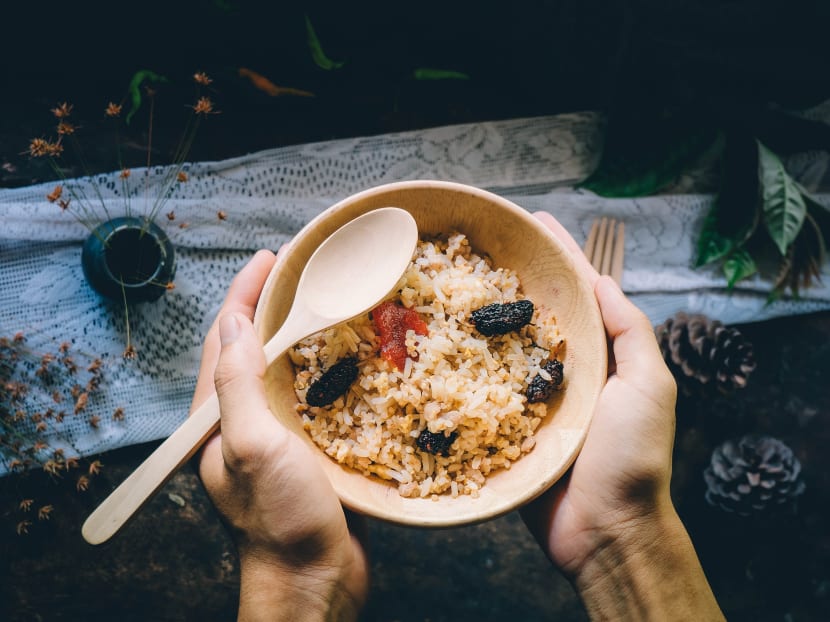Sheng Siong joins FairPrice in offering discounts on healthier rice options
SINGAPORE – Supermarket chain Sheng Siong will be joining NTUC FairPrice in offering special discounts on healthier rice products, in a bid to get Singaporeans to replace white rice in their diet.

Replacing white rice with brown or mixed grain rice could help curb diabetes. Photo: Kawin Harasai/Unsplash
SINGAPORE – Supermarket chain Sheng Siong will be joining NTUC FairPrice in offering special discounts on healthier rice products, in a bid to get Singaporeans to replace white rice in their diet.
Brown rice is generally more expensive than white rice, though the price gap can vary depending on the brand and type of grain.
Responding to queries from TODAY, a Sheng Siong spokesperson said on Monday (Aug 21) that it is offering a 10 per cent discount on its house brands Royal Golden Grain brown rice products, and the Happy Family Red Cargo rice vermicelli.
Members of the public can buy these discounted rice products from Monday till the end of the month across its 43 outlets.
Prices for the brown rice products range from S$6 for 2.5kg, to S$10.70 for 5kg.
From Tuesday, selected brown rice and low glycaemic index (GI) rice products will also go on discount.
The spokesperson added that the offers were to “support our Government’s call to fight against diabetes”.
FairPrice has announced that they are offering a discount of at least 10 per cent on eight healthier rice products, till Aug 30, to moderate the costs of healthier food alternatives and encourage healthier eating among Singaporeans.
These range from brown, red, organic and low GI rice, and include the FairPrice house brands as well as rice products from brands, such as the Golden Phoenix germinated jasmine rice and Bamboo Hill organic brown fragrant rice.
Meanwhile, a Dairy Farm spokesperson, which runs Cold Storage and Giant supermarkets, said they have all along been working with their suppliers to offer special discounts or promotions for brown rice on a “regular basis”.
Prices range from S$7.10 to S$12.65 for 2 to 2.5kg of brown, red or mixed rice at their outlets.
During the National Day Rally on Sunday, Prime Minister Lee Hsien Loong had urged Singaporeans to replace white rice – an Asian staple – with brown or mixed grain rice. He also likened the consumption of white rice to “almost like eating sugar”, despite it not tasting sweet.
However, former nominated Member of Parliament Calvin Cheng pointed out in a Facebook post that eating healthy is often not a choice for the low-income.
“For example, PM Lee encourages people to eat brown rice and wholemeal bread. However, brown is more expensive than white rice; wholemeal bread is more expensive than white bread,” he noted.
Mr Cheng suggested that the authorities subsidise the healthier versions of staples such as rice and bread, adding: “If diabetes is a crucial issue, then making sure that low-income people have a real choice to eat healthily should be a national priority."
Mr Vincent Goh, project initiator of ground-up initiative A Packet of Rice that distributes lunch boxes to the elderly living in the Jalan Bukit Merah rented flats, said they intend to work with their current caterer to switch from white rice to mixed-grain rice provided that no additional costs are incurred.
The group does not have the “luxury budget” to pay for more expensive brown rice as they are a self-initiated community group, added Mr Goh, 36. The group distributes about 600 packets of lunch boxes to 300 elderly residents twice a month.
“The main concern for these needy residents is to ensure that the financial assistance they receive each month is able to cover the meals (for) the whole month and to fill up their stomach each day, (much less) think if these are healthier choices of food,” he noted.
While his group may be able to provide one or two healthy meals for the needy, it might not be sustainable in the long run, added Mr Goh.






